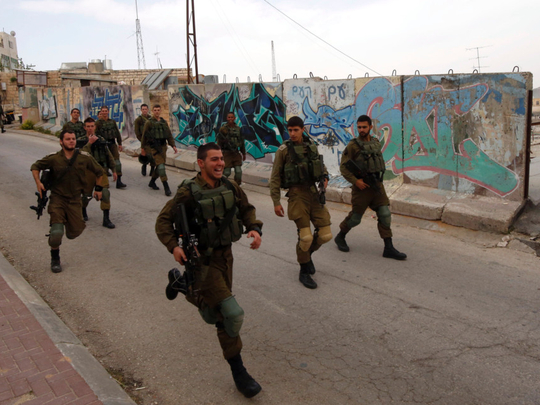
Around 1,300 Palestinian prisoners in Israeli jails continue to carry out their hunger strike in protest of the poor legal affairs and living conditions — a protest that shames the international community as it continues to observe this tragedy, wrote Qatar’s Al Raya. “The international community must move quickly to end this legacy of serious violations that the Israeli Occupation continues to inflict upon Palestinian prisoners. Israel has to be pressured in order to ensure that it respects international laws and implements articles of international human rights laws in Occupied Palestine to end the suffering of Palestinian prisoners. The inhuman practices of Israel against these prisoners cannot be accepted by Palestinians, Arabs, the Islamic world and the international community, and calls for accountability for the suffering the prisoners. It is worth noting that these inhuman practices were not restricted to men, but also included women and children under the age of 18.”
The hunger strike that nearly 1,200 Palestinian prisoners in Israel have begun is bound to ratchet up tension between Israelis and Palestinians in the coming days, said the Saudi Gazette. “Israel does not recognise Palestinian prisoners as having the status of prisoners of war. The prisoners are instead charged with terrorist offences or violent crimes, or administratively detained without charge. The distinction is huge. According to the Geneva Convention, Palestinians who are part of the resistance, even if armed, should be entitled to prisoners-of-war status and not called terrorists. Hunger strikes continue to be one of the most prominent tools of struggle and confrontation of the occupation. At the end of last year, the number of Palestinian prisoners had reached approximately 7,000, including around 300 minors and 53 women. That more than 1,000 are on hunger strike is a remarkable number that should worry Israel.”
The Palestinian prisoners’ hunger strike is an act against their jailers, rejecting their humanitarian violations, said the UAE’s Al Khaleej. “This message was conveyed in the letter sent by Palestinian prisoner Marwan Barghouti, which was published in the New York Times on the first day of the hunger strike. Perhaps he had hoped that the letter would end the world’s silence over Israel and the way it challenges international legitimacy and all agreements and conventions pertaining to human rights. Israel’s response was to subject Barghouti and other prisoners to solitary confinement ... The Palestinian prisoners’ uprising is a message to the Palestinian people and leadership, to the people of the Arab world and Arab organisations, and to the entire world. A clear message that states the prisoner movement is part of the Palestinian people’s national struggle.”
Prisoners on hunger strike are asking, among others, for better medical care, family visits and to be allowed access to telephones, wrote the Jordan Times. “Israel refuses to negotiate with them. Worse, there are those, like the Israeli justice minister, who say that authorities ‘would not hesitate to implement the law that authorises force-feeding of detainees’, a controversial law passed in 2015 that sanctions what Palestinian human rights group Al Haq considers ‘tantamount to torture’.”




_resources1_16a31069e4e_small.jpg)





